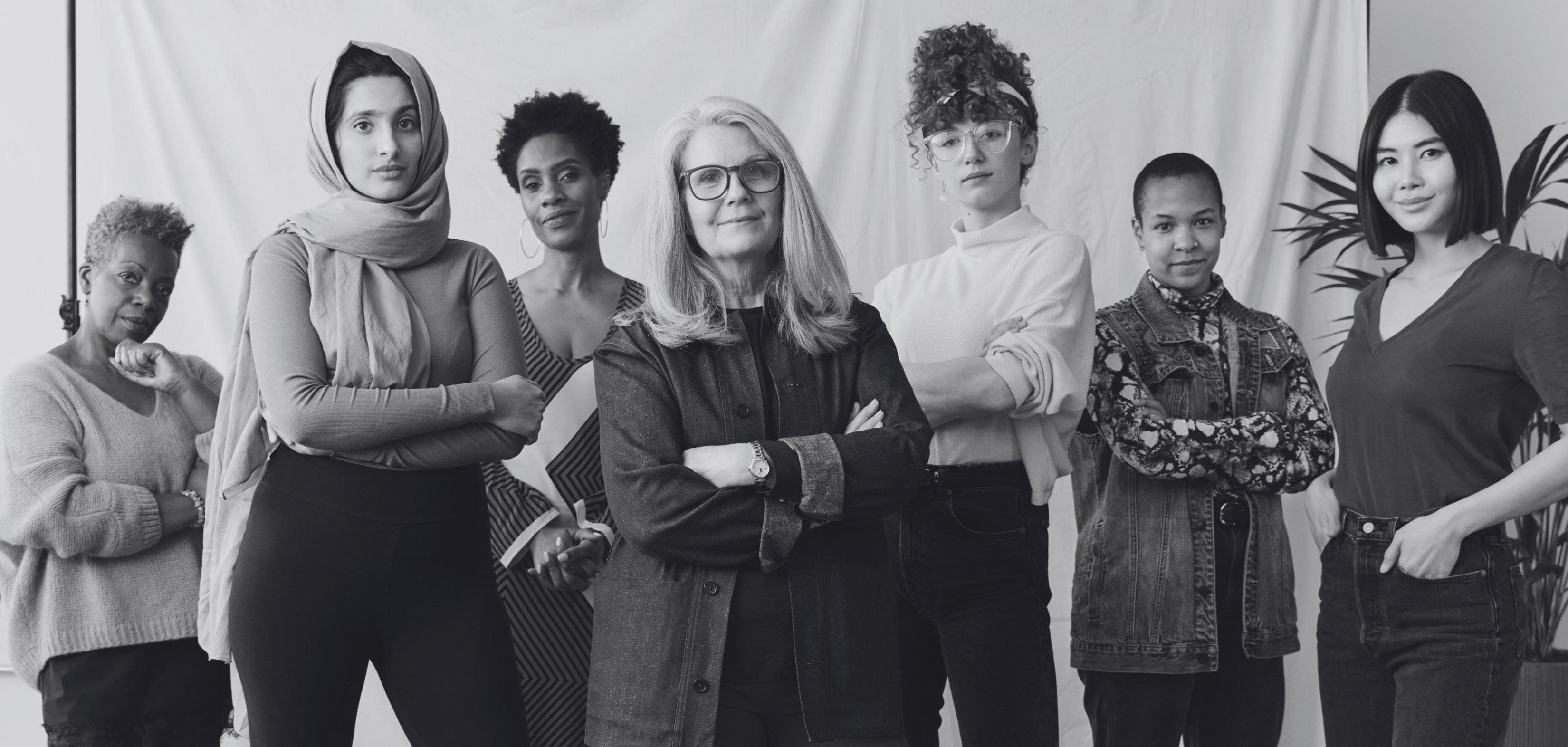

THE MAGAZINE

UNITED WE is a NATIONAL, NONPROFIT, NONPARTISAN THINK-AND-DO-TANK DRIVING SYSTEMIC CHANGE BY FOCUSING ON WOMEN’S LABOR FORCE PARTICIPATION TO STRENGTHEN THE OVERALL ECONOMY.
A Letter From Guest Editor : Kimmi Chex

Dear Readers–
How special is it to pen a letter with such enthusiasm as we look forward to this spring and summer with United WE. While much in our country can feel divisive and even uneasy, what is known to us, is the tireless advocacy our organization is committed to championing. Our non-partisan footprint allows us to protect and uphold the advocacy we so fiercely believe is not a political bargaining tool. The empowerment of women is a human right and our work places us at the forefront of necessary research, solutions and results that ensure our collective success and agency.
I first got involved with United WE, formerly the Women’s Foundation of Kansas City in 2012. I was 16 years old and joined the Girls Grant Project– a program for high school upperclassmen who formed a junior board with real grant money allocating funding to local female-based non-profits across Kansas City. At 16, I was exposed to the power, the advocacy, and the privilege of sitting in a room with likeminded young women whose passions stemmed from community philanthropy. The Girls Grant Project changed the trajectory of my life in ways I’m forever
Meet Our Guest Editor
Kimmi Chex United WE Board Member, NFL Network On-Air Personality
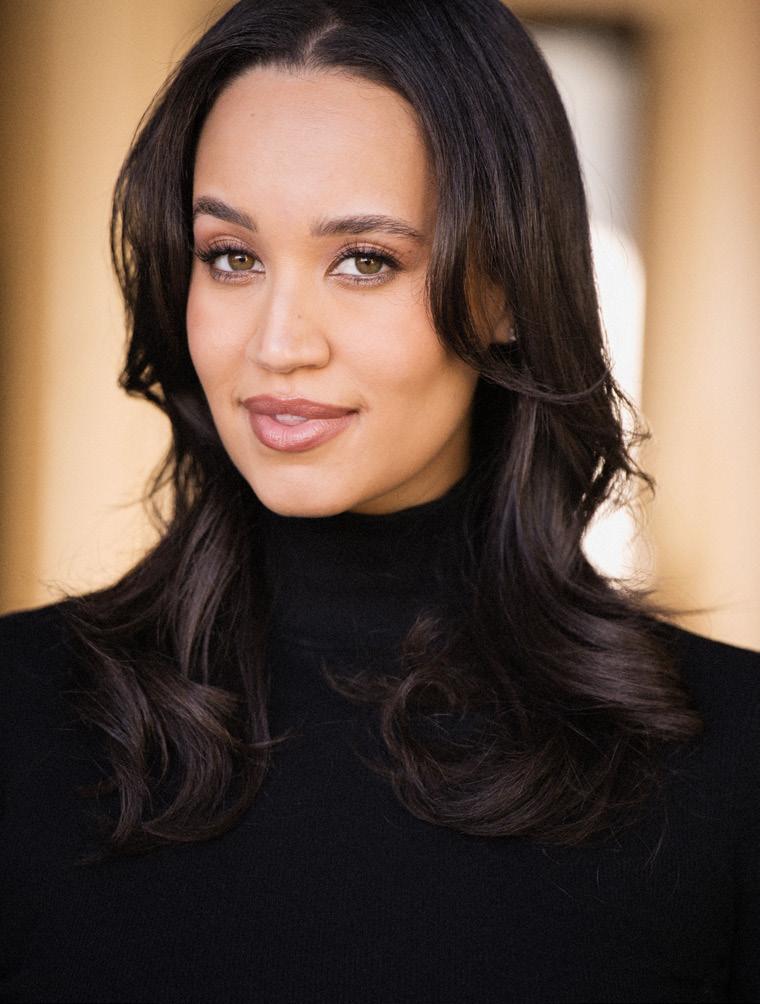
indebted. Now, I am honored to sit on the board of United WE and continue to use that same passion to impact our now national mission driving systemic change by focusing on women’s labor force participation to strengthen the overall economy.
While the work in the boardroom is important, the work of amplifying the national voices of women across our country can be even more powerful. We are excited to introduce and start to build out The Studio—an amplification platform inspiring people to continue the conversation around elevating women in the workplace and beyond. Our collective voices are our superpowers and our stories deserve to be told. Through events, content, networking opportunities and more, United WE is excited to tell women’s stories in a way that deeply connects and can provide our audience research-backed content and experiences that foster a network of allies.
As we continue to build this new initiative, we look forward to collaborating with you as we listen and tell the stories worth sharing with the world. I can’t wait to be the voice my 16 year old self would be proud to advocate for. I do this work now knowing that the future is written in our voices—bold, unapologetic and unstoppable.
- Kimmi Chex

Kimmi Chex is a national NFL Network on-air personality and board member of United WE. Her journey with the organization began at age 16 through the Girls Grant Project, where she discovered the power of advocacy and community. Today, Kimmi brings that same passion to the national stage—amplifying women’s voices, driving systemic change, and supporting research-backed solutions to strengthen women’s economic participation. She is committed to telling the stories that inspire bold, unapologetic, and lasting change.
Viewpoint: The DeBruce Foundation

Bridging the Gap: How Intergenerational Mentorship Changed My Career Path
Joining forces with The DeBruce Foundation, we’re embarking on a powerful storytelling initiative. The DeBruce Foundation, dedicated to expanding pathways to economic growth and opportunity, empowers individuals to discover their ideal career paths, and we’re excited to share those journeys.
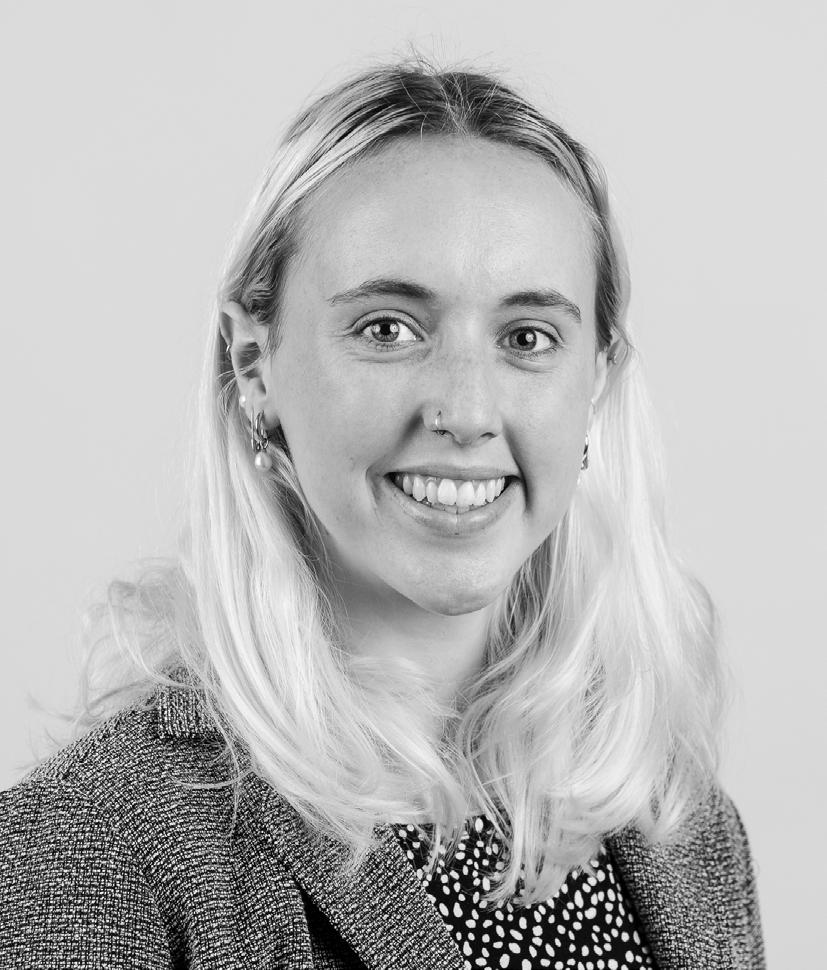
SYDNEY BOYD
Sydney Boyd graduated from the University of Missouri - Kansas City in December 2024, where she double majored in Political Science and French Language and Literature. Her passion for her community and addressing systemic barriers is what led her to work with The DeBruce Foundation
as a Strategic Communications Intern from September 2024 to May 2025, while also being a member of DeBruce Career Corps. There she learned about the power of Networking Strength and Career Literacy through the research conducted by the Foundation, but could not have been as successful in creating connections without the mentorship there. “The team at The DeBruce Foundation showed that they were not only invested in developing me as their intern, but also as a young professional looking to continue my work in the nonprofit industry.”
Sydney found mentors in many forms during her internship, from her supervisor, coworkers, and even through leadership who invited her to events like Champions for Change where she had the opportunity to meet and hear Wendy Doyle speak. She
has been able to find support and encouragement from the women at The Foundation in times like employment searching and in everyday career development. Sydney even has realworld experience using the tools in The DeBruce Foundation’s Graduation Toolkit, like the Networking with Agilities© resource.
Mentorship comes in many forms and Sydney is fortunate to have family and friends who invested early in her professional development. “My first mentor was my mom and she still is. She is always the first person I call when I need advice while on the job hunt or before networking events.” She is passionate about supporting working women and expanding inclusive opportunities for everyone in the workplace. Without the guidance from

her mentors over the years, Sydney would have struggled to communicate how her interests, passions, and skills prove her loyal in supporting missiondriven organizations.
Navigating the professional world alone can be a barrier in some ways for young adults; learning from other people’s experiences helps to better prepare for what to expect. You need connections and guidance; mentorship is a crucial aspect of developing as a young professional. It provides advantages in job coaching, support during application processes, and someone to keep you accountable. Sydney is grateful for the women in her life who have developed her into the leader she is today and plans to share that investment with other women in her life and those she will work with in the future.
Networking with Agilities
The Agile Work Profiler© is a free, 15-minute career assessment that helps you discover your top workforce strengths—your “Agilities.” By answering questions about what you enjoy and excel at, you’ll gain insight into the skills and interests that drive your career potential.
Take the Assessment
RESEARCH Keeping an Eye on National Trends in Childcare Policy
A Conversation with Elliot Haspel from independent think tank, Capita.

Since identifying childcare as a critical barrier to women’s economic leadership, United WE has continued to forge new partnerships, conduct groundbreaking research, and develop actionable solutions to this urgent crisis. One of our national partners is Capita, an independent think tank that works to craft effective policies for a future in which families and their communities can flourish.
The Studio recently sat down with Elliot Haspel, a senior fellow at Capita and a national thought leader on this issue, to shed light on the current state of childcare policy and why organizations like United WE are crucial to driving positive change.
United WE: Where do you think we stand as a country in terms of expanding access to affordable, quality childcare - and what are
some of the big-picture trends happening across different states?
Elliot Haspel: Broadly speaking, the state of childcare in America continues to be problematic. It’s a sector that struggles to serve almost everyone involved. It’s too expensive and hard to find for parents, staff and educators are underpaid, and even business owners struggle to make ends meet. The fundamental issue is how we treat childcare in the United States. We view it more as a private commodity, like a gym membership or dining out, rather than an essential part of our social and economic infrastructure, like schools or roads.
To put this into perspective, the public funding for education is over $800 billion annually, averaging $14,000 per child. In contrast, public funding for childcare is less than $40 billion,
about $1,500 per child, with even less allocated for infants and toddlers. If we reduced public school funding to $1,500 per child, the entire system would collapse. That’s the reality we’re facing with childcare right now.
United WE: We have been particularly focused on the supply side of the equation, including licensing issues. Could you talk about that and why it’s important?
Elliot Haspel: Childcare licensing and regulations are often outdated and hinder supply, and modernizing these systems is essential. However, we must distinguish between health and safety regulations and quality and regulations which aim to help with quality but may miss the mark from a cost-benefit standpoint.
While everyone agrees on the need for minimum child-adult ratios to ensure safety, many other licensing regulations are unnecessarily burdensome. Some regulations are extremely specific, detailing the number of blocks per child, while others are simply outdated. For instance, an Illinois regulation still requires childcare providers to carry coins when taking children on walks, a relic from the pre-cellphone era when payphones were necessary for emergencies. Streamlining licensing programs is vital to help more providers open and stay open while
Annual Public Funding For Education $800B
Averaging $14,000 per child.
Annual Public Funding For Childcare <$40B
About $1,5000 per child, with even less allocated for infants and toddlers



maintaining essential health and safety standards.
United WE: One underappreciated aspect of the childcare crisis that United WE research has illuminated are the challenges faced by women entrepreneurs. Are there innovative solutions being explored to address this?
Elliot Haspel: You’re right to point that out - and it’s another area where licensing reform can help. The need for more non-traditional and irregularhours care is indeed a significant concern, especially for entrepreneurs. Starting a business often means lacking traditional employee benefits and requiring more flexible childcare arrangements. Family childcare is often best suited to offer these nontraditional hours, but there’s a growing conversation about supporting part-
time and drop-in childcare options. Interestingly, more businesses are emerging to meet this demand, indicating entrepreneurial interest in the sector. However, licensing regulations often create barriers. Supporting entrepreneurship and small businesses requires innovative childcare solutions that cater to nontraditional schedules and part-time needs.
United WE: What’s an important trend in childcare that our subscribers should be watching in the years ahead?
Elliot Haspel: One significant and often overlooked aspect is the role of “family, friend, and neighbor” (FFN) caregivers. These are relatives, grandparents, or neighbors who provide a substantial amount of childcare in this country. Traditionally,
“Creating a system that supports all forms of care—formal, informal, and parental— is crucial for building a robust and equitable childcare infrastructure.”
they’ve been disconnected from public support systems and face many hurdles in accessing assistance. There’s an emerging conversation about how governments can support FFN caregivers through direct payments, social connection training, or innovative models like the “We Play Center” in New Orleans, which offers free drop-in childcare and workshops for caregivers. This type of support acknowledges the informal side of childcare and the important role these individuals play. Additionally, we need to recognize and support stay-athome parents who are either unable to find affordable childcare or choose to stay home.
Moving forward, our vision for the future of childcare should embrace diverse types of care and ensure parents have legitimate options and choices that work best for their families. Creating a system that supports all forms of care—formal, informal, and parental—is crucial for building a robust and equitable childcare infrastructure.
/ ELLIOT HAPSEL
SOLUTIONS

Alderwoman Latrice Thomas Talks
About Why More Women
Should Get Involved in Public Service
Empowering Women In Civic Engagement Through The Missouri Appointment’s Project Journey Groups
LATRICE
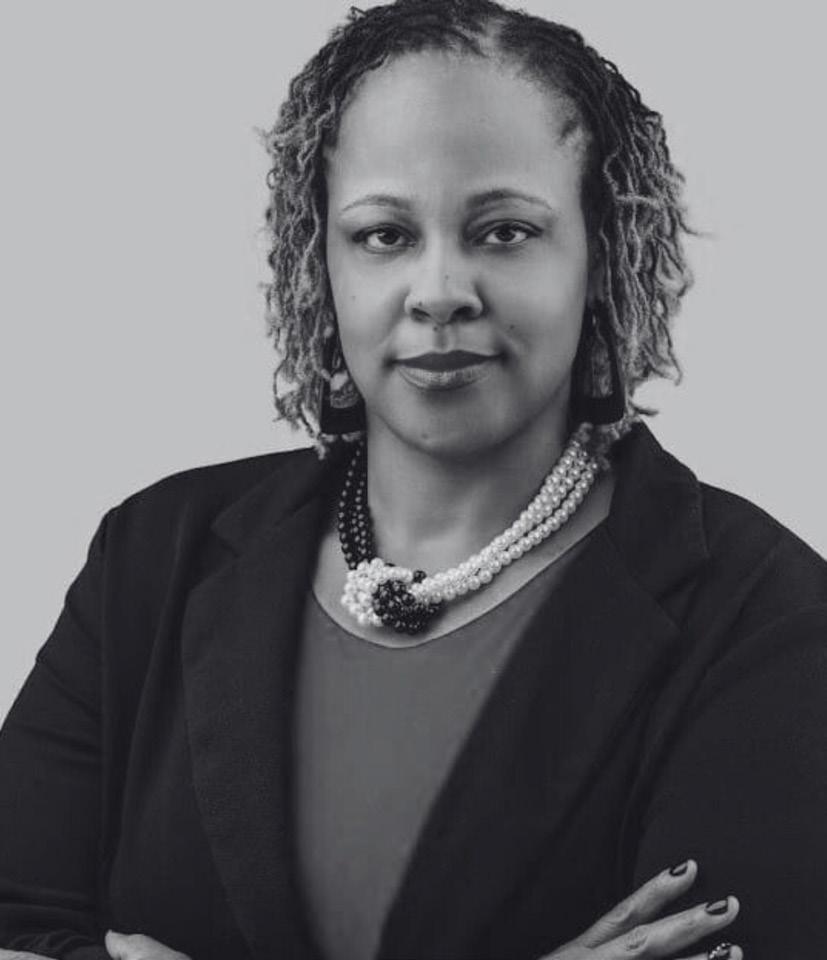
Latrice Thomas is a Kansas City native who participated in one of United WE’s Journey Groups. After serving in an appointed position, Latrice was elected to the Raytown Board of Alderman in 2025. The United WE Studio sat down with Latrice to talk about why
she decided to take the plunge into public service, and her advice for other women considering the same journey.
Q: Can you tell us about your journey into public service?
A: I’m a Kansas City native with a 20-year career in healthcare, specifically reproductive health and gender diversity. I always had an interest in politics, but I focused on being a mother. However, the more I heard women’s stories, the more I felt compelled to raise my voice and represent Black women in that space. I started as a Jackson County committee woman, advocating for my community there. That role allowed me to hear people’s voices and understand their needs, as well as learn more about political education.
I decided to run for Raytown Board of Alderman in 2025, even though it meant going against an incumbent. I spoke with other elected officials to weigh the pros and cons, and ultimately decided to pursue it.
Q: How did the Journey Group prepare you for serving on a board or commission?
A: I loved the Journey Group experience. I was already subscribed and was impressed with the facilitators and the intimate, small group setting. It seemed to target professional women but was inclusive of everyone. The word “journey” attracted me, as I was looking for support and tools. At that point, I was considering a new journey.
Q: What advice do you have for other women thinking about an appointed or elected position?
A: The Journey Group prepared me in many ways, particularly in confidence, leadership skills, and support. We shared our goals, received guidance, and delved into what those goals would look like. The exercises created a space where we saw ourselves as individuals and yet connected. We heard each other and formed a bond. I felt supported and encouraged, like I had a cheer squad.
Q: Why do you think it’s important
for women to be represented in local government?
A: Local government directly impacts people’s lives. Often, people are unaware of what’s happening locally and how it affects them. We need to address local issues and speak up. Local government really does matter.
Q: What are you excited about in your current role?
A: I’m excited to be one of three Black women on the board and to bring a younger perspective. I think people have been impressed by my curiosity and openness to new ideas. Sometimes it takes a new person with a fresh perspective to ask “Have we tried this?” or “Have we thought about that?” Above all, it’s about finding real solutions for the people.
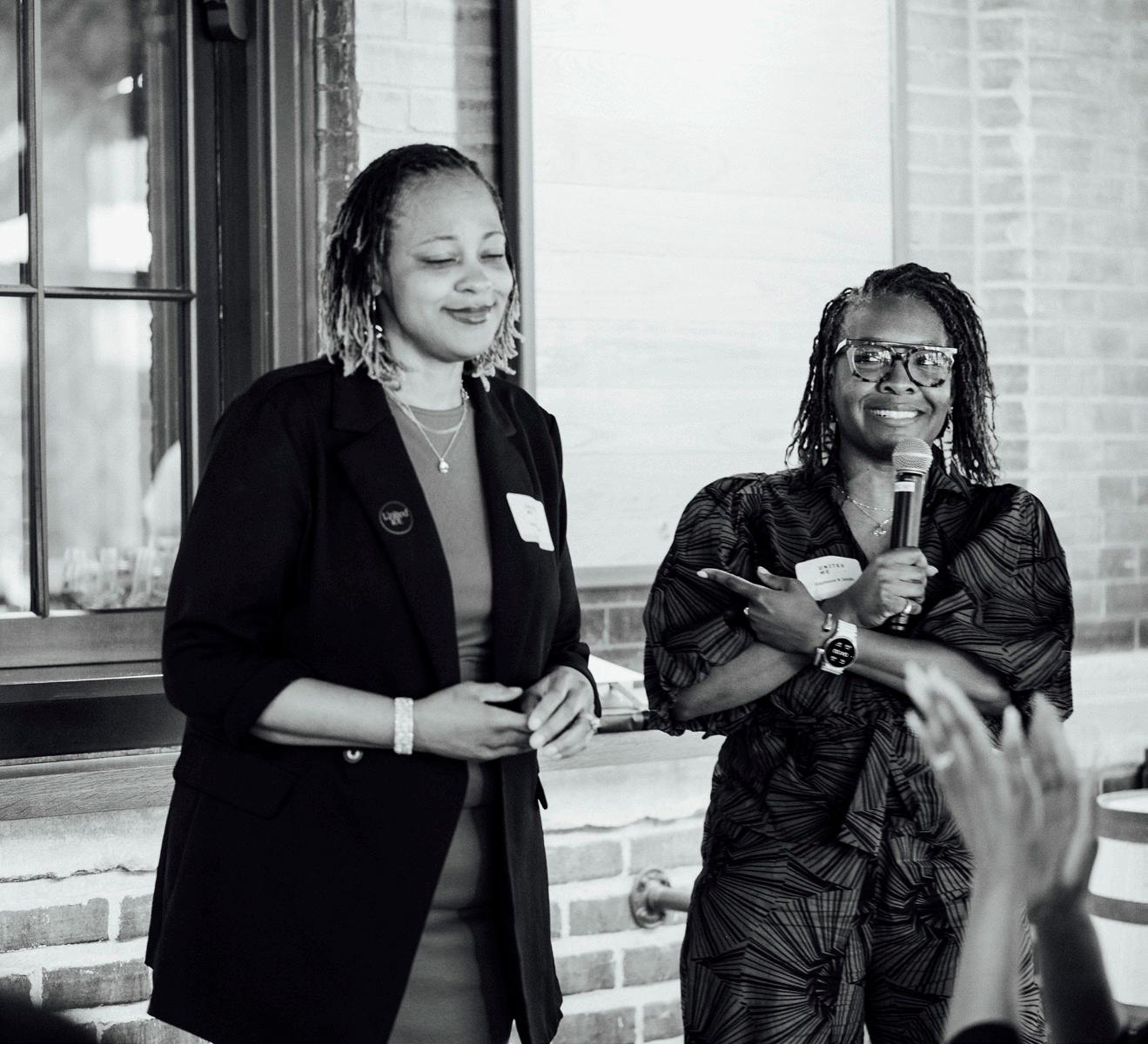

“Local government directly impacts people’s lives. Often, people are unaware of what’s happening locally and how it affects them. We need to address local issues and speak up. Local government really does matter.”

/ LATRICE THOMAS
Progress Update on Childcare in Missouri

This year, United WE helped rally a bipartisan coalition behind a bill to make childcare more affordable and accessible in Missouri. The legislation, which would have created several new tax credits to help parents, employers and providers offset childcare costs, passed the House but stalled in the Senate—despite heroics from the bill's sponsors, State Representative Brenda Shields and State Senator Lincoln Hough. The good news: Governor Mike Kehoe's effort to review and streamline childcare licensing rules, another United WE priority, is moving forward, with a report due to the Governor's desk in September.

RESULTS Meet Two Women Behind a Bipartisan Childcare Victory in Kansas

Kansas Senate Minority Leader Dinah Sykes (D-Lenexa) and State
Representative Laura Williams (R-Lenexa) may be on opposite sides of the political aisle, but they are united by a passion for tackling Kansas’ childcare crisis.
They are also both moms, and their priorities and leadership styles have been shaped by their first-hand experiences with the skyrocketing costs and scarcity of childcare in the state.
Earlier this year, their persistence paid off when Governor Laura Kelly signed bipartisan childcare legislation, a big win for Kansas families and a key priority for United WE. House Bill 2045 establishes the Kansas Office of Early Childhood and streamlines the state’s childcare licensing system – creating a one-stop-shop designed to expand the supply of childcare providers Kansas families urgently need.
Years in the making, the new law is a testament to United WE’s
groundbreaking research on the barriers to childcare access, and the leadership of these two women who worked across partisan lines to make progress on this issue.
“When my kids were little, I stayed home because we couldn’t afford to put two kids in childcare – and childcare has only gotten more expensive since then,” said Senator Sykes. Streamlining the state’s childcare programs and licensing will be “monumental,” Sykes says, because everything providers need to start up and stay in business – from applying for grants to getting licensed – will be under one umbrella.
As a young mom, Rep. Williams also
struggled with the cost of childcare.
“I loved being a mom, and I also loved working. But childcare was so expensive that at times we just couldn’t afford it. That always frustrated me because I felt like that should be something attainable for people.”
She credited a coalition of young parents in the Legislature who continued to “poke the bear,” encouraging leaders from both parties to prioritize childcare as an urgent workforce development issue. Everyday Kansans making their voices heard was critical as well. Rep. Williams recalled a fellow member of the House telling her that childcare had come up in his rural community during a totally unrelated meeting about water issues.
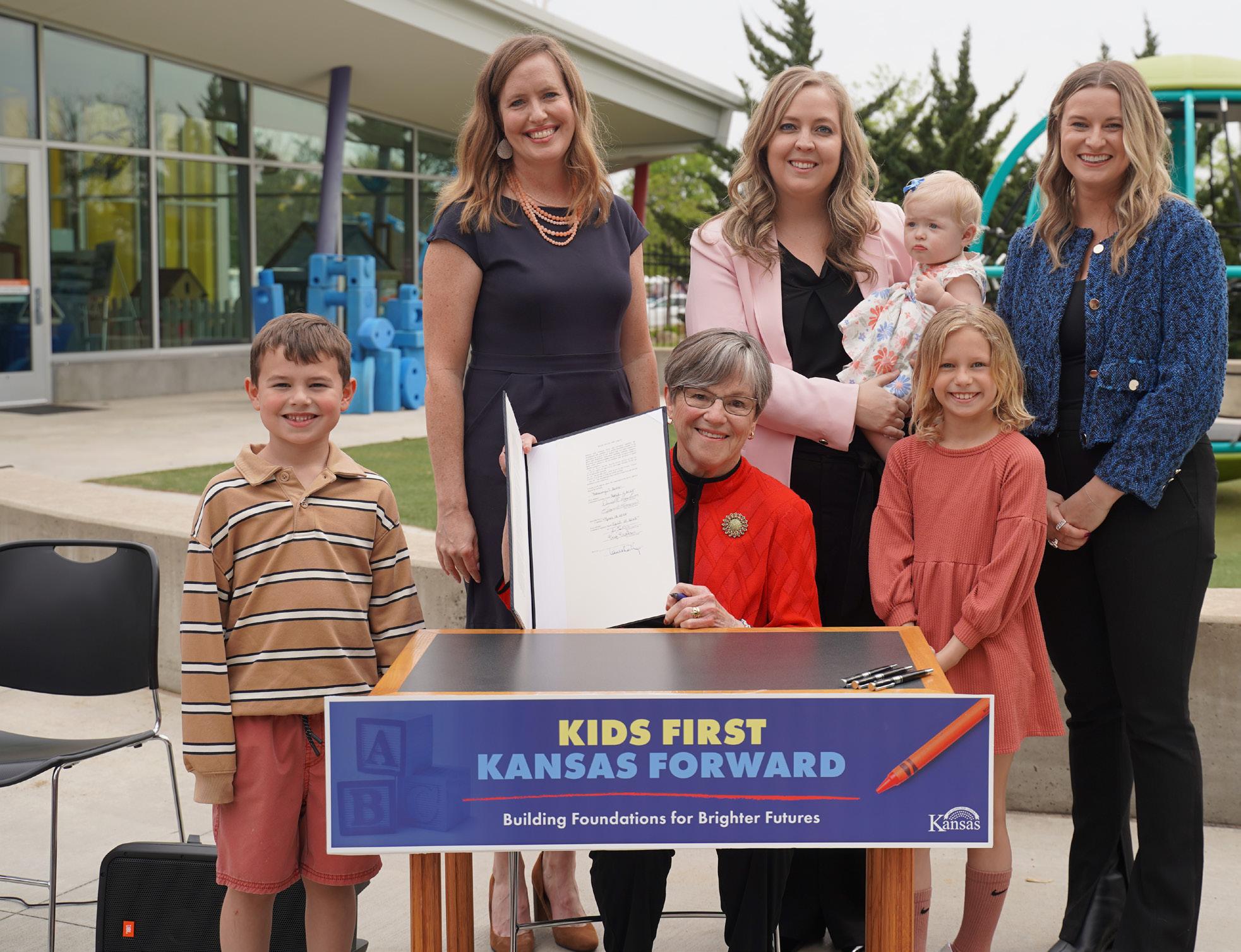
Both legislators reinforced the importance of nonpartisan organizations like United WE who can bring evidence-based research to the table in a way that helped persuade lawmakers to see childcare as an economic and workforce development issue.
“I remember [United WE President and CEO] Wendy Doyle citing a statistic about how women’s labor force participation during the pandemic had dropped to its lowest level since 1987, and it was a fact that I continued to repeat in conversations with my fellow legislators,” Williams said.
“United WE coming in as a nonpartisan process,” said Sykes.
Moving forward, United WE will work to replicate this success in states across the country – rallying both women and men to break down barriers to women’s workforce participation, and strengthen the economy for everyone.

“Through your comprehensive research and advocacy, United WE continues to be instrumental in identifying and addressing the systemic barriers that make it challenging for families to access affordable, high-quality childcare.”
/ GOVERNOR LAURA KELLY
Kansas Governor Laura Kelly signs bipartisan childcare bill
CHAMPIONS FOR CHANGE Leveling the Playing Field
On May 7, 2025, United WE hosted Champions for Change at Arrowhead Stadium Club in Kansas City, bringing together leaders and advocates to discuss sports economics and women’s advancement in the industry.
A Powerful Conversation
The NFL Network’s Kimmi Chex moderated a powerful conversation between Jacquelyn Dahl, CEO of 1UP Sports Marketing, and Lara Krug, Chief Marketing Officer and EVP of Marketing at the Kansas City Chiefs.
Reflecting on their barrier-breaking careers, the women discussed how organizations can do more to support women leaders in sports and across industries.
All three women emphasized the importance of not only having women in leadership roles - but spotlighting them. “I didn’t know until last week that the CEO of Footlocker is a Woman,” Jacquelyn said. “You’ve got to let the world know because if the young 10 year old girl doesn’t see it, then she doesn’t know that it’s possible.”
Another key takeaway from the conversation: the perils of gatekeeping and the importance of listening to women. “There is power in knowledge, and the only way we’re going to accelerate other women to the top is by sharing that knowledge,” Jacquelyn said.
Lara said: “Listen to women, and allow them to come together to give recommendations that may drive impact...There is power to having women at the table.”
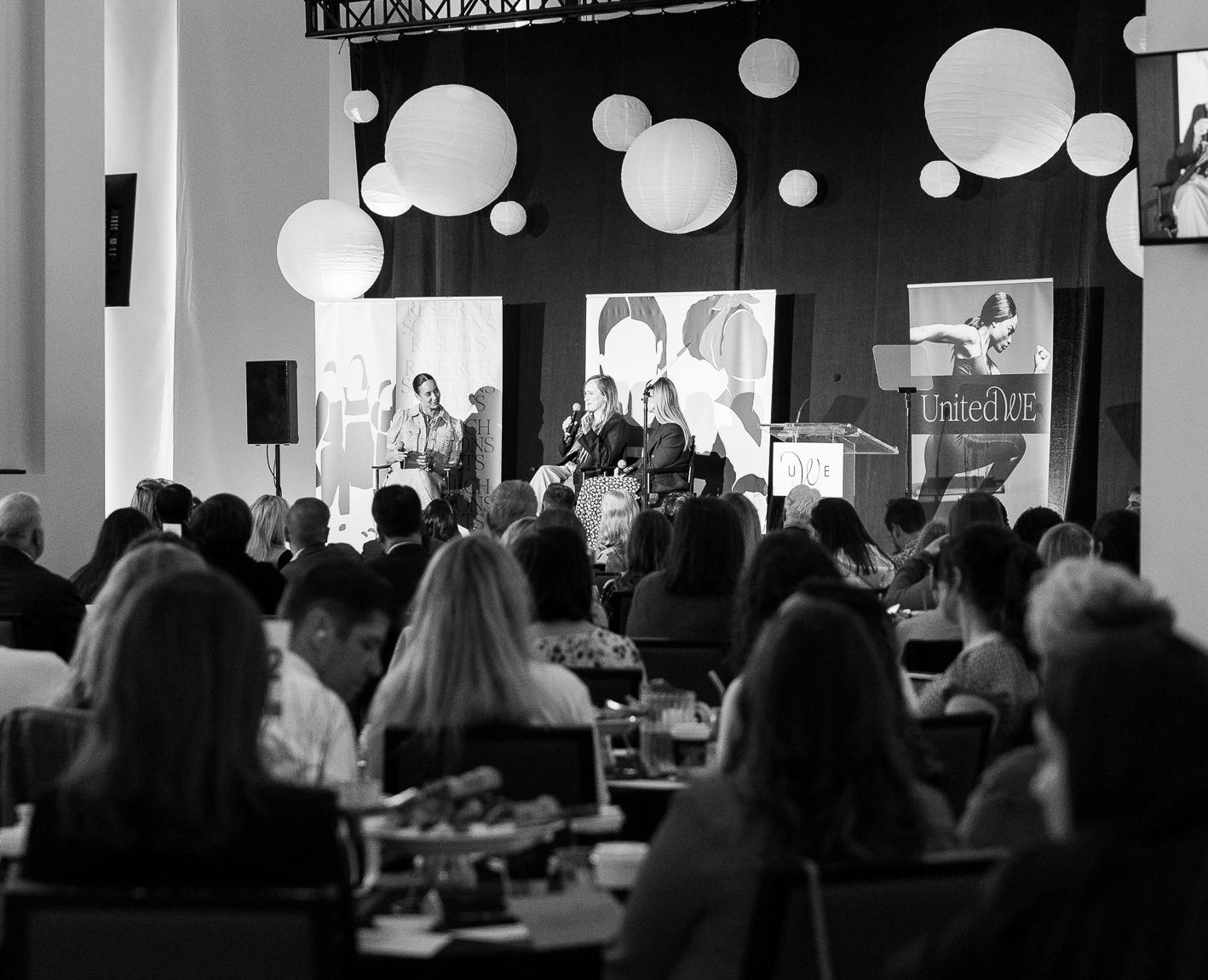

From Field to Fortune: The Economic Rise of Women’s Sports
In a dynamic conversation, Caitlin Carducci and Bonnie Bernstein emphasized how teamwork fuels success - on the field, in the boardroom, and beyond. Many successful C-suite leaders credit their time in sports for shaping how they collaborate, lead, and problem solve with peers today.
They discussed the groundbreaking impact of the KC Current’s new stadium, the first built exclusively for a professional women’s sports team. More than just a venue, the stadium has helped transform Kansas City’s Berkley Riverfront into a thriving destination. Champions for Change 2025
“It isn’t a moment, it’s a movement,”
said Carducci, reflecting on the rising momentum of women’s sports. The confidence gained through sports empowers women far beyond the game, shaping how they lead, collaborate, and succeed in every area of life.
For those interested in the event’s highlights and discussions, a virtual recording is available on the United WE website.
Watch What Happened
The recording of the 2025 Champions for Change Virtual Event is now streaming. Watch it Here
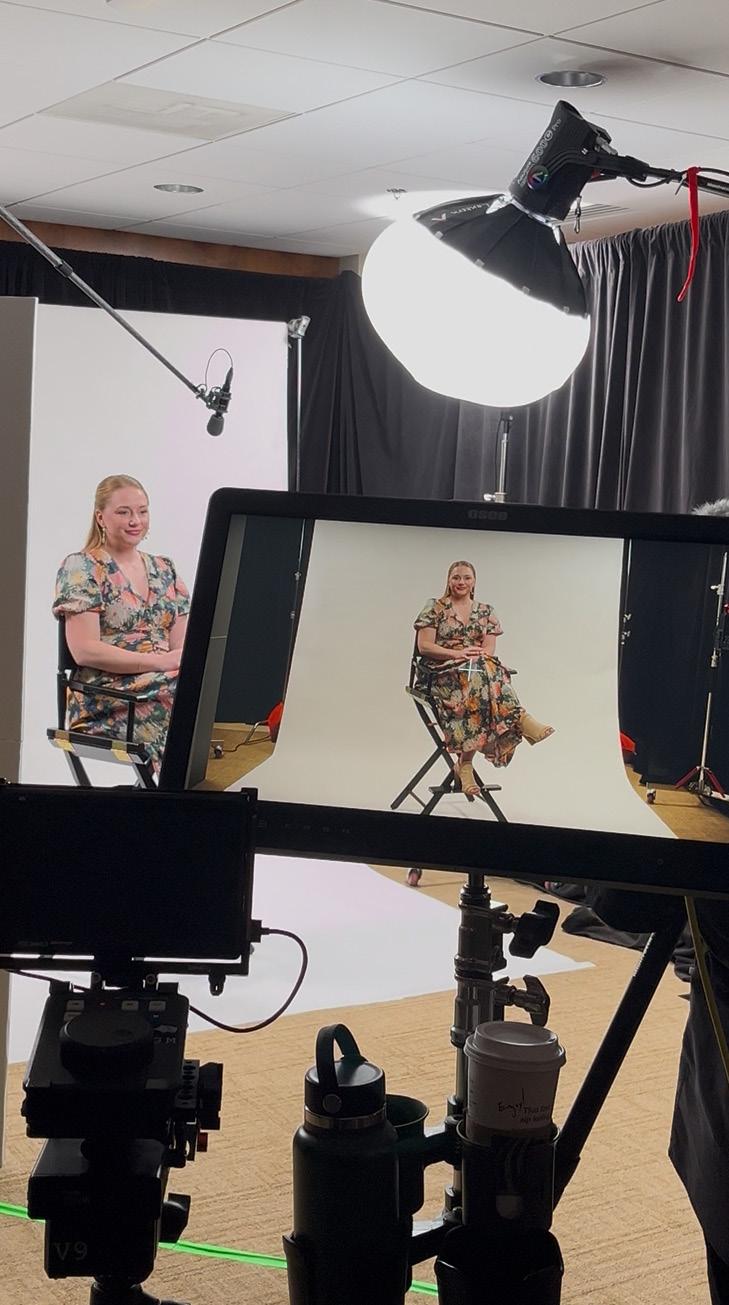
Champions For Change 2025
“It’s women in leadership roles, being a part of the discussion, creating the conversation, that ultimately impacts the bottom line of a corporation.”

/ WENDY DOYLE, PRESIDENT & CEO OF UNITED WE
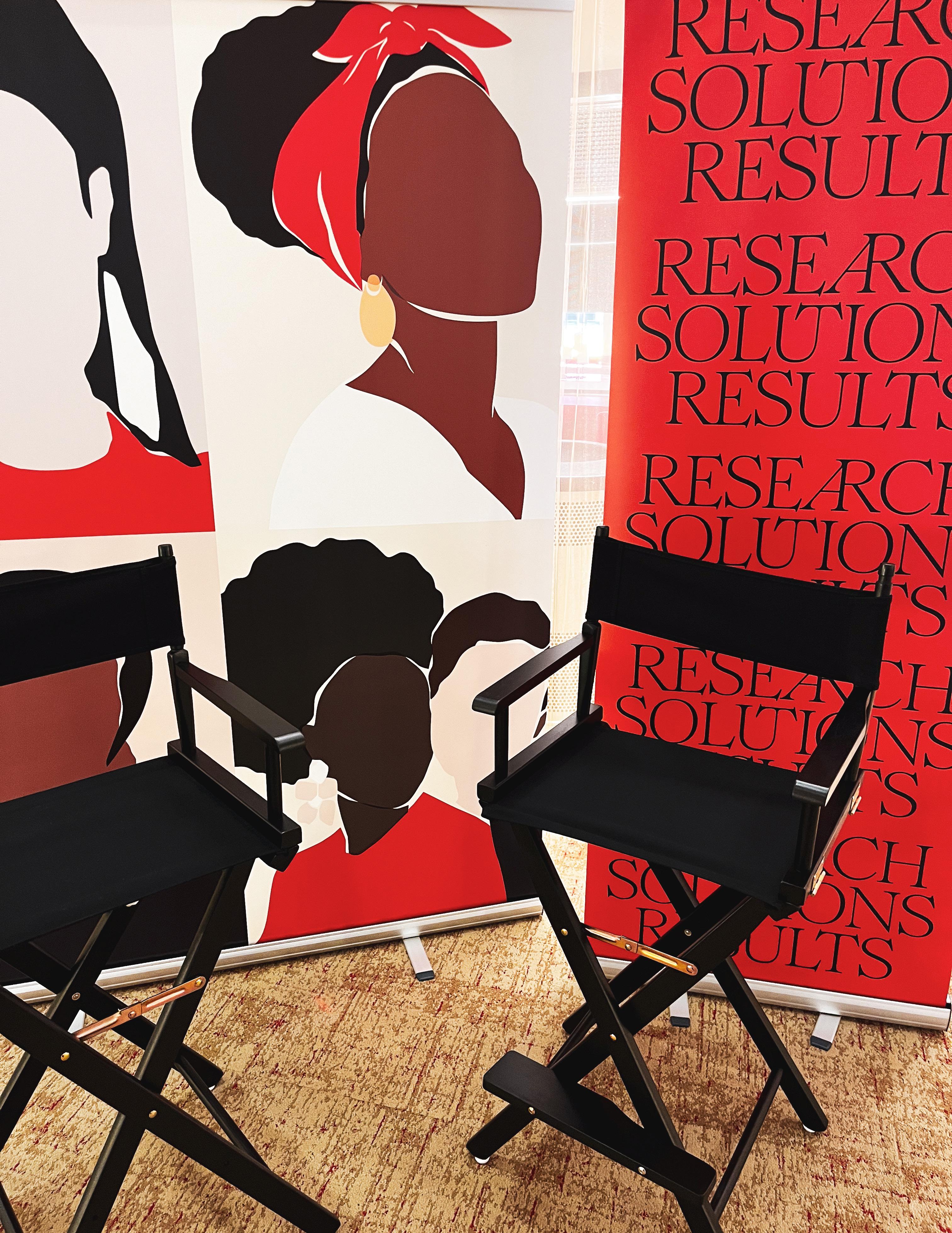
Limitless Women Who Lead
United WE celebrates individuals like Danielle P. Coulter who are leading change, breaking barriers, and expanding what’s possible for all women – economically, civically, and beyond.
Danielle P. Coulter is, among other things, an athlete, entrepreneur, actress, and author. Across all these identities, she is also a trailblazer who challenges outdated perceptions of disability and encourages others to embrace their full potential. Danielle was born with Cerebral Palsy and has made it her life’s mission to inspire people to follow their dreams and not accept limits.
In 2001, Danielle made history as the first adaptive snowboarder with Cerebral Palsy, leading the way for others with different abilities to shred the mountain. She began skiing with Challenge Aspen when she was five years old. At age nine, Danielle and her ski instructor, Rich Ganson, visited local sports stores to gather equipment to build the first adaptive snowboard, in partnership with a friend and longtime adaptive ski instructor Bobby Palm.
Over time, Freedom Factory improved the design so more people with disabilities experience snowboarding. In her autobiography, Snowmass Angel: Danielle P. Coulter – A Biography, Danielle writes, “I hope one day we can build more snowboards like mine and give other people with disabilities who want to snowboard a chance to do it. I want

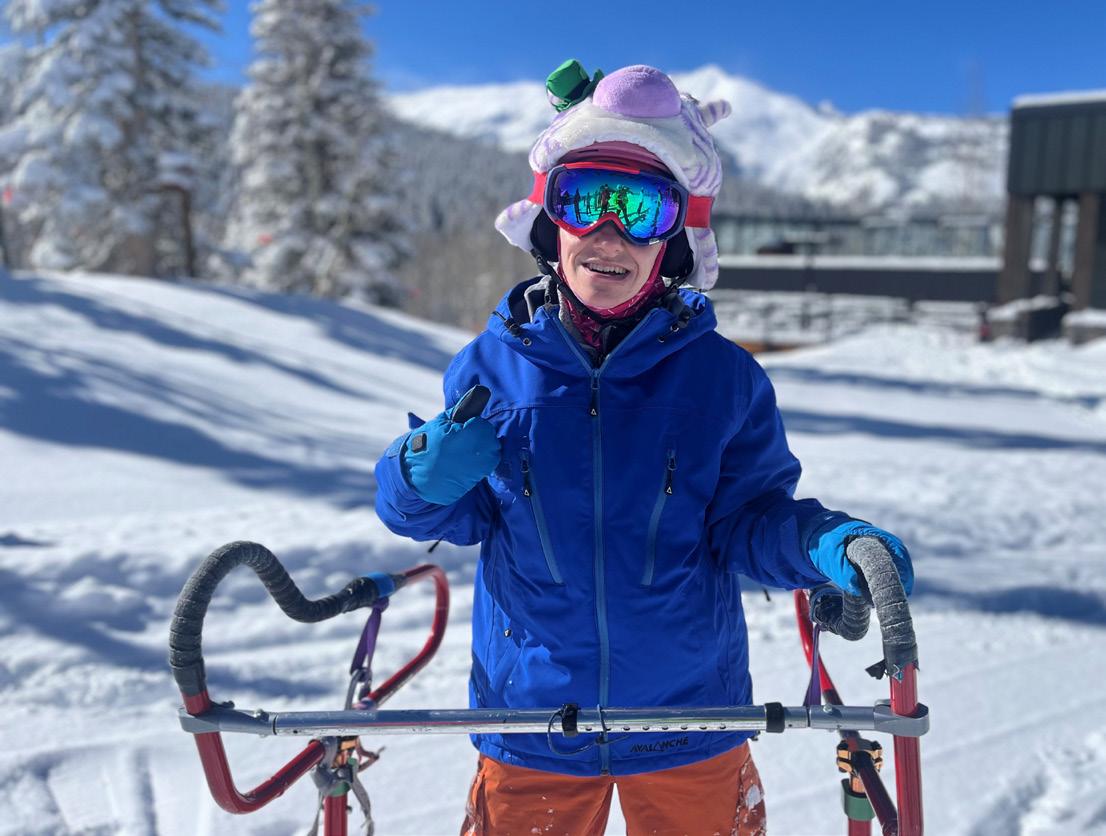
them to feel like a free bird and feel the wind in their faces, just like me!”
As an author, Danielle challenges assumptions about disability and sparks imagination. Her children’s books, including The Hard Life of Zoe and Zoe and the Great Easter Egg Hunt, follow the adventures of a young girl with Cerebral Palsy. Her autobiographies, If Dan Can Shred, You Can Too and Snowmass Angel, have reached readers around the world with messages of determination and inclusion.
Danielle is also active in her local community and focuses on spreading joy through clowning, puppetry, and playing a bubble fairy. Whether

she’s making children laugh, telling stories, or creating moments of wonder, Danielle brings the same energy and heart to her volunteer work as she does to everything else. Her mission remains constant: to make people smile and believe that you can accomplish your dreams.
Danielle is a woman who leads with determination and joy—and refuses to accept limits for herself or others. Thank you, Danielle, for all that you do! We look forward to hearing what adventure or idea you pursue next. You can learn more about Danielle at www.dancanshred.com and find her books on Amazon.

Monthly Giving Community
Join us in your support of
THE CABINET
We invite you to become a cornerstone of United WE’s work by joining The Cabinet, our monthly giving community. You might be wondering, why $51? Because women comprise 51% of the U.S. population, yet remain significantly underrepresented in leadership positions across industries and government. Join The Cabinet today on our website.
$51/ each month
